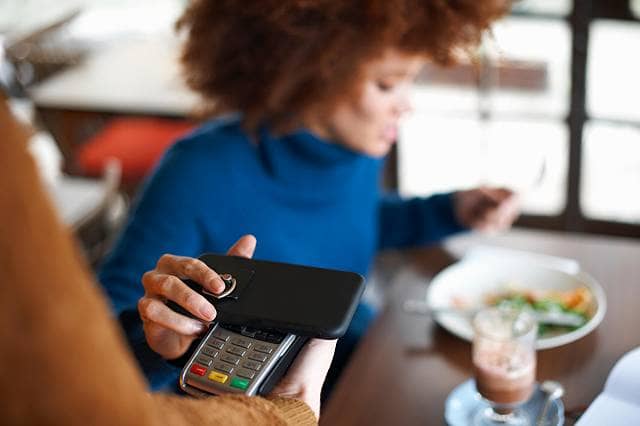Near Field Communication payments, or NFC payments for short, have revolutionised the customer experience by creating fast and convenient transactions on the go. However, consumers will naturally worry about the potential risks associated with contactless payments, which is why all businesses and merchants must care too.
Here’s all you need to know about the security issues surrounding NFC, including how to protect employees and customers alike.
How safe are NFC payments?
NFC is the technology that facilitates mobile payments, which now account for about two-thirds of all card payments in the UK. Given the incredible popularity and widespread use of the technology, it is no surprise to learn that it is a very safe solution.
When making a payment, the customer uses their bank card or mobile wallet to communicate with a payment terminal and complete the payment process. The tap-to-pay solution started at traditional POS terminals but, thanks to advanced facilities like mobile card readers, salespeople can now take payments on the go too.
NFC payments are supported by two-way encryption, thus providing an extra layer of security compared to swiping debit cards. Encrypted data and one-time-use codes are delivered in a way that prevents hackers from infiltrating the data.
Generally speaking, then, it is one of the safest payment methods available. Moreover, most people (particularly younger generations) trust the technology, which is a far cry from a decade ago when 56% of people felt it was not secure.
Protecting yourself and customers against NFC scams
NFC may be one of the safest payment solutions, but that doesn’t make it invulnerable. However, by understanding the potential risks, you should be able to prevent scams and keep all parties protected.
NFC skimmers
ATM skimming is when a fraudster puts an NFC-enabled card reading into the ATM machine. This will subsequently record the customer’s payment data when they use the machine to complete a transaction. They can subsequently use this payment data to facilitate fraudulent purchases and drain a person’s bank account.
It is primarily a threat to ATM machines and POS terminals. If a terminal is left unattended, you should check to see if an NFC skimming device has been attached to the original device. Meanwhile, it’s important to always buy card readers and other payment devices from legitimate sources. Otherwise, scammers may have pre-installed the damaging devices that send data to them.
NFC fraud
NFC fraud is when criminals manage to access data by hacking into a device. Once they do this, it is possible for them to duplicate the NFC chip and subsequently take funds from the account without having the original device. Education is the key to preventing this scam, and your business can certainly advise customers on the threat of using the same PIN for multiple apps and/or allowing payments from a locked device.
From the company’s perspective, it’s important to ensure that the right cybersecurity features are in place. Likewise, any NFC-enabled device should not be left unattended as physical theft will open the door to NFC fraud. Your POS app should use a passcode to give consumers extra protection.
NFC poster scams
NFC technology doesn’t always have to feature a direct connection to a payment terminal. It could, for example, be a poster that then takes a client to a product page where they can make an online payment through an eCommerce platform. When legitimate, it is a valuable tool for businesses and consumers.
However, it is possible for fraudsters to create fake posters that cause users to unknowingly infect their devices with malicious applications or data. This could potentially cause them to gain access to the consumer’s NFC payment details, as well as a host of other private information. Meanwhile, posing as your company could also mean that the hacker steals your business.
NFC interceptions
Also known as eavesdropping, this is a situation in which an attacker intercepts the communication between two devices. This can then record the private data and even manipulate it. While this can only happen if the criminal is in close proximity, a single incident could spell disaster for both parties involved in the initial transaction. NFC relays are a similar attack that will send the recorded data to another device.
NFC interceptions could also create contact between two devices without one party’s knowledge. Turning the NFC settings off when it does not need to interact with other devices can help. The process will vary from one device to the next but is usually found in the general settings.
Conclusion
NFC payments are safe for businesses and consumers, but it’s important to stay vigilant to nearby threats. When you are aware of the scams, secure payments are assured.






Leave a Comment